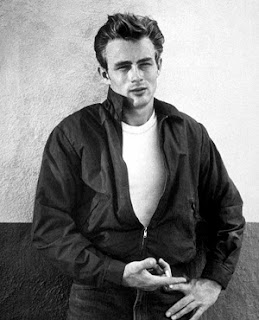He beat out hundreds of other actors to play Malcolm in Macbeth, which spurred him to drop of out college and act full time. After a few commercials and walk-on roles in Hollywood, he moved to New York where he came into method acting at the Actors Studio. He worked in television and theater, which led to his return to Hollywood for the role of Cal Trask in East of Eden. The film would be a tremendous success, which was only to be overshadowed by Rebel Without a Cause. 1956 would give Dean another break-out role in Giant, which would win him an Academy Award with his willingness to portray Jett the oil tycoon as older with gray, receding hair.
During the filming of Giant, Dean would experience what he called “one of the spookiest things” in his life. In addition to acting, he had become a great racing enthusiast. He traded for a 550 Porsche Spyder, one of only ninety made, which was nicknamed “Little Bastard.” Customized by George Barris of Batmobile fame, the car had tartan seating, striped wheelwells, and its name painted on its sleek silver. He was so proud of the car that he showed it off to Alec Guinness immediately upon meeting the great actor. Guinness said that a “strange thing” came over him with an “almost different voice” telling Dean, “'If you get in that car, you will be found dead in it by this time next week.”
Dean had never been one for taking advice from his elders (such as the rift in his relationship with his father when he had given up the idea of law school), but Guinness's words seemed to sink in. The next week he was headed to Salinas, CA, for a sports car race. At the last moment, he decided that he ought to drive the brand-new car to familiarize himself with it rather that put it in a trailer. Just before getting into the car, he thought of Guinness and decided against it. Near Cholame, a Ford Tudor took a fork at speed and buzzed directly in front of the truck pulling the trailer, nearly throwing them off the road. Dean imagined that if he had been driving, he would have been in the Ford's path, and Guinness's words would have come true.
While at the race, Dean sold the Spyder, saying he didn't believe in curses but that he'd “rather not risk it.” Later in his life, Dean would become an enthusiast for racing as well as car safety. While against Nixon's lowering of speed limits on interstate highways, Dean was a great component for safety belt laws and innovations in airbags and retardant foams. He is famous for his public service announcement repeating his ad-libbed line, “The life you might save might be mine.”
Dean would act in 44 movies over his illustrious career. He would be known for his roles in The Magnificent Seven, Cool Hand Luke, Hang 'em High, and, perhaps most famously, Easy Rider. Other films would pit him against Marlon Brando, another famous bad boy, with him gaining the role of militaristic Colonel Kurtz in Apocalypse Now, but losing out for Jor-El, Superman's father, though Dean would return as General Zod for the sequel. His final role would be as the aged Ed Bloom in Tim Burton's Big Fish, which critics said gave an extra layer of distrust to the father's tales, further darkening the film.
In 2006, at age 75, Dean repurchased his Porsche 550 and took it for a drive. It was found by a patrolman on an early morning at a scenic overpass with Dean inside. The actor had died of a stroke but reportedly had a smile on his face.
–
In reality, Dean did drive “Little Bastard” to his death, one week after Alec Guinness had warned him.









